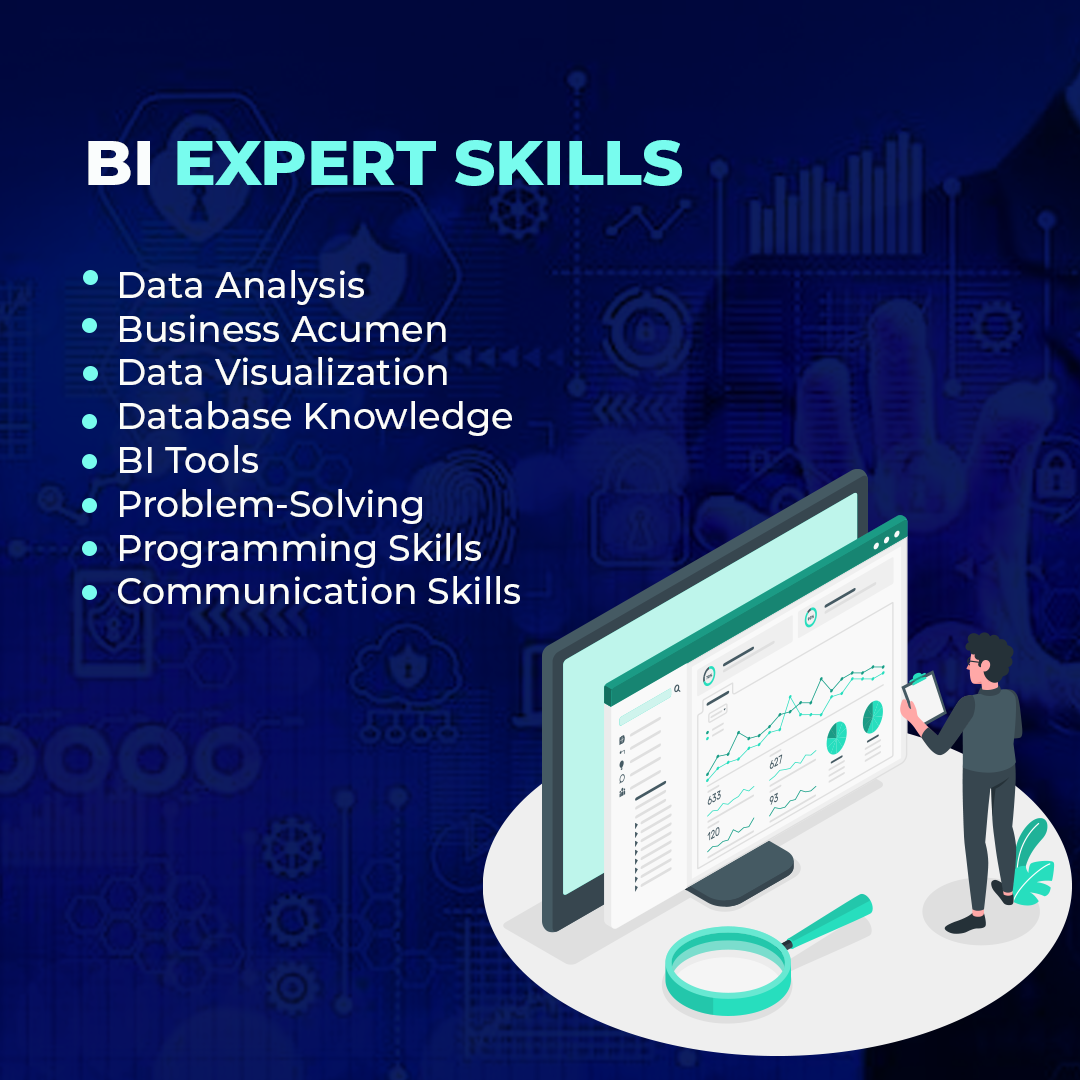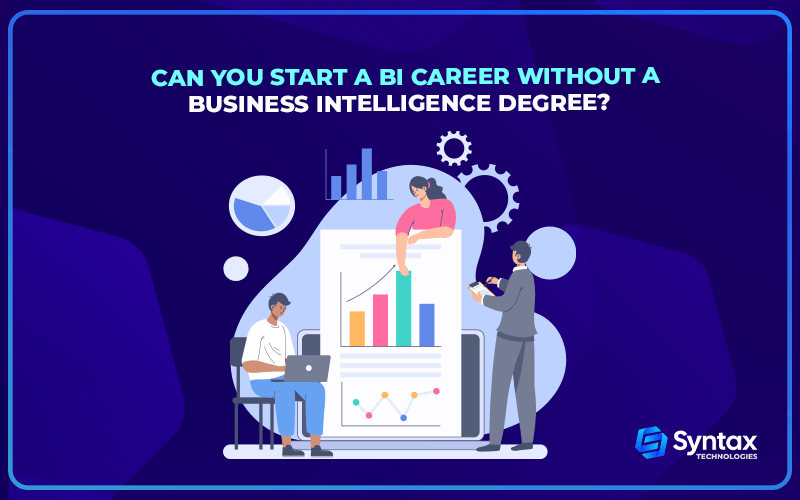As companies seek to harness the power of data to gain valuable insights and stay competitive, the demand for skilled BI professionals continues to grow exponentially.
While a formal education in Business Intelligence may seem like the most obvious path to enter this thriving field, the truth is that the landscape of Business Intelligence career has shifted, opening doors to aspiring professionals from diverse educational backgrounds.
In this blog, we will explore the question that many curious minds ponder: Can you start a BI career without a Business Intelligence degree?
We will uncover the crucial skills, alternative educational routes, and the boundless opportunities that await those passionate about shaping a successful BI career, regardless of their degree path.
An Overview of Business Intelligence Degrees
A Business Intelligence (BI) degree is an academic program that teaches students the skills needed for Data Collection, analytics, and decision-making. These degrees are available at the undergraduate and postgraduate levels and cover various subjects like Data Science, visualization, and statistics.
These degrees are available at the undergraduate and postgraduate levels and cover various subjects like data analysis, visualization, and statistics. While a formal BI degree can offer a comprehensive foundation, the industry has evolved, and there are now alternative routes to start a Business Intelligence Career.
Online learning platforms and Certified Business Intelligence Professional certifications have become valuable options for gaining the necessary skills and knowledge in BI without pursuing a dedicated BI degree.
This shift in the landscape allows aspiring BI professionals to explore diverse educational paths while still accessing rewarding opportunities in the field.
Finding Opportunities in the BI Industry Without a Degree
In this section, we shall look at the Business Intelligence Analyst Positions available that individuals can pursue without holding a formal BI degree.
As the industry places increasing emphasis on practical skills and Business Operations, candidates with a strong aptitude for Data Collection, problem-solving, and a willingness to continuously learn can explore roles like Business Intelligence Manager and Data Warehouse specialist.
- BI Analyst: Business Intelligence Analysts are responsible for gathering and analyzing data to provide valuable insights that inform business strategies and decision-making. The average Business Intelligence Analyst Salary is competitive, reflecting the importance of the role.
- Data Analyst: Data analysts focus on interpreting and transforming data into actionable information.
- Data Visualization Specialist: Professionals in this role are experts in translating complex data into visually engaging and easily understandable charts, graphs, and dashboards.
- BI Developer: BI developers design and implement data solutions, including data warehouses, databases, and ETL (Extract, Transform, Load) processes.
- Data Engineer: Data engineers focus on the design and construction of data pipelines and systems to collect, store, and process data.
- Business Intelligence Consultant: BI consultants work with clients to understand their business needs and develop tailored BI solutions.
- BI Support Specialist: These professionals offer technical support for BI systems, assisting end-users with troubleshooting, training, and resolving BI-related issues.
- Freelance BI Consultant: As a freelance BI professional, individuals can offer their services to multiple clients, working on diverse projects and building a strong portfolio of BI work.
What Skills Are Necessary For A BI Career Without a Degree
A successful Business Intelligence (BI) career without a formal degree requires a combination of technical, analytical, and soft skills.
While a degree can provide a structured foundation, aspiring BI professionals can still excel in the industry by developing the following essential skills:
- Data Analysis: The ability to clean, process, and analyze large datasets, as well as extract meaningful insights, is crucial for driving data-driven decision-making.
- Business Acumen: Understanding business processes and objectives is vital for BI professionals to align data analysis with the organization’s strategic goals.
- Data Visualization: Strong data visualization skills enable BI professionals to communicate complex findings effectively.
- Database Knowledge: A basic understanding of databases and data structures is essential for BI professionals to access and manage data effectively.
- BI Tools: Proficiency in BI tools like Tableau, Power BI, QlikView, or others is crucial for creating interactive dashboards and reports.
- Problem-Solving: BI professionals must be adept at identifying business challenges and using data analysis to propose effective solutions.
- Programming Skills: While not always necessary, having programming skills (e.g., Python, R) can enhance a BI professional’s ability to manipulate and analyze data efficiently.
- Communication: BI professionals need to explain technical concepts to non-technical stakeholders, making effective communication crucial for successful project outcomes.

What Non-Traditional Education Options Are Available
In today’s digital age, non-traditional education options have flourished, providing diverse paths for individuals to acquire knowledge and skills outside of traditional formal degrees. Here are some non-traditional education options available:
- Online Learning Platforms: Numerous online learning platforms, such as Coursera, Udemy, Syntax Technologies, LinkedIn Learning, and edX, offer a vast array of courses on various subjects, including Business Intelligence and data analytics.
We, at Syntax Technologies, provide you with the unprecedented opportunity for developing skills in line with the demands of the Business Intelligence as well as the Data Analytics industry. Enroll today.

- Industry Certifications: Many organizations and technology providers offer certifications in specific BI tools and technologies. Earning these certifications demonstrates expertise and can be a valuable addition to a resume.
- Bootcamps and Intensive Workshops: BI bootcamps and intensive workshops provide immersive, short-term training that focuses on practical skills and hands-on experience.
- MOOCs (Massive Open Online Courses): MOOCs are online courses that are often free or low-cost, providing access to educational resources to a large number of learners worldwide.
- Self-Learning and DIY Projects: With the wealth of free online resources, aspiring BI professionals can take a self-directed learning approach.
- Data Hackathons and Competitions: Participating in data hackathons and competitions offers an opportunity to apply BI skills to real-world problems and gain recognition for one’s abilities in the data community.
- Community College and Continuing Education Programs: Community colleges and continuing education centers often offer affordable and flexible courses in data analysis, database management, and BI tools.
Articles you may like:
Business Intelligence Jobs: A Career to Look Forward to
Top 30 Business Intelligence Interview Questions
How To Become A Successful Business Intelligence Analyst: Tips And Strategies
What Resources Are Available To Help You Succeed In A BI Career without a Degree
Online learning platforms offer BI-related courses, while industry certifications and data analytics challenges provide practical expertise.
Open-source BI tools, blogs, and community forums offer additional learning opportunities. Attending networking events and webinars allows for connections with industry professionals. Internships, freelance work, and continuing education programs help gain hands-on experience.
By continuously learning, building skills, and utilizing these resources, individuals can excel in the BI field without a degree.
Conclusion
In conclusion, a career in Business Intelligence without a degree is possible with the right combination of knowledge, skills, and resources.
With access to non-traditional education options such as online learning platforms and bootcamps, as well as industry certifications, self-learning projects, hackathons, and continuing education programs, aspiring BI professionals can acquire the necessary skills to start or advance their careers.
By leveraging these resources and staying up-to-date on trends in the field, individuals can achieve success in a BI career without having to pursue a formal Business Intelligence degree.

